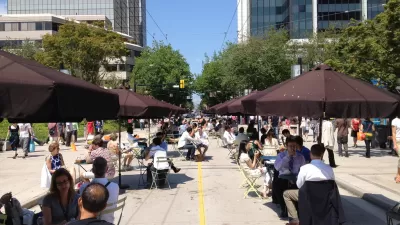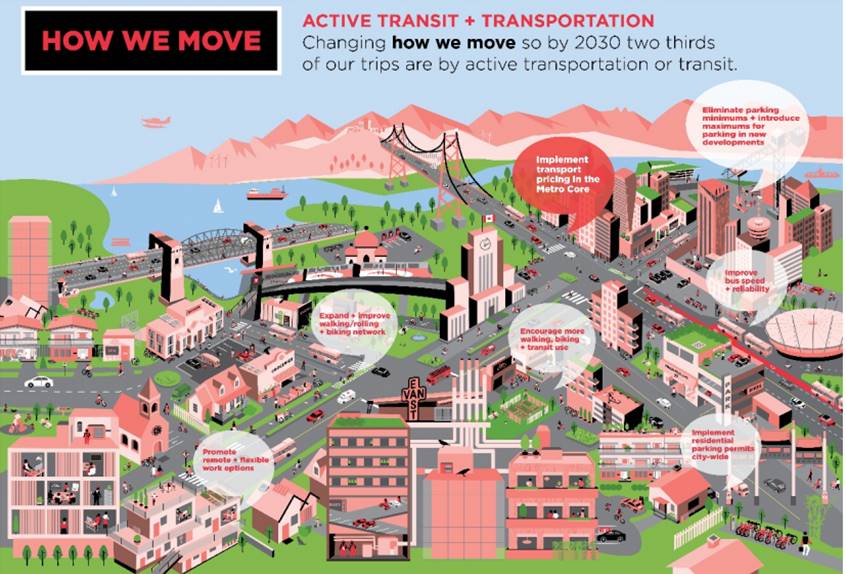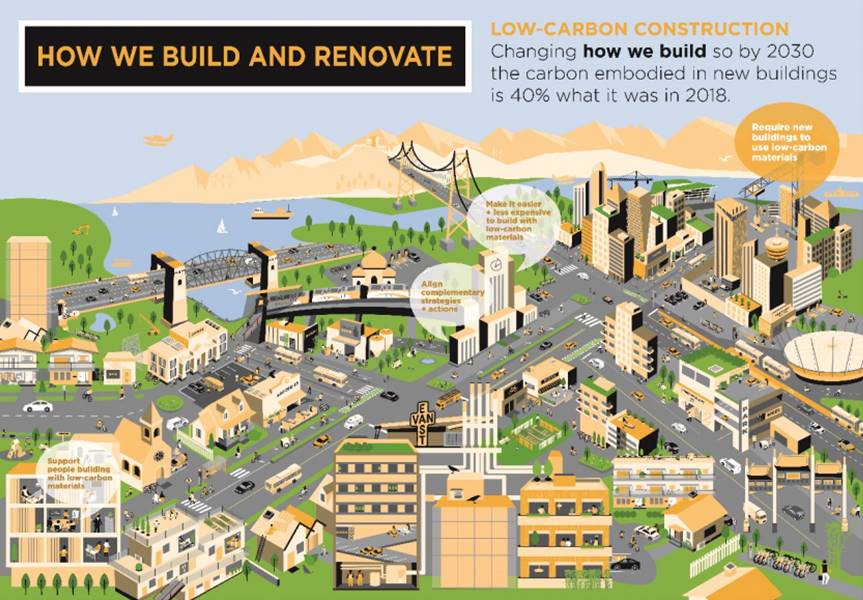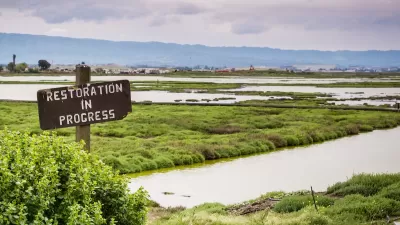The city of Vancouver's new Climate Emergency Action Plan incorporates a comprehensive scope of goals, including affordability, public health, and social equity, which can help build broad public support.

The city of Vancouver's new 371-page Climate Emergency Action Plan includes ambitious targets (called "Big Moves") to reduce climate change emissions and achieve other economic, social and environmental goals.
Big Move 1: by 2030, 90% of people live within an easy walk/roll of their daily needs. Make low-cost sustainable transportation options easy, safe and reliable for all Vancouverites, so that people get to work, school and other destinations without needing to rely on gas and diesel vehicles and the noise and pollution they produce.
Big Move 2: By 2030, two thirds of all trips in Vancouver will be made on foot, bike or transit.
Big Move 3: By 2030, 50% of the kilometres driven on Vancouver’s roads will be by zero emissions vehicles.
Big Move 4: By 2030, the carbon pollution from buildings will be cut in half from 2007 levels.
Big Move 5: By 2030, the embodied emissions from new buildings will be reduced by 40% compared to a 2018 baseline.
Additional goals:
Ensure that everyone has the opportunity to live and work in zero emissions buildings, and is able to benefit from the comfort, quiet, healthy air, and lower energy costs they offer.
Share the costs of reducing our carbon pollution in ways that reflect people’s ability to contribute to that transition.
Create new and varied opportunities for people to participate in a zero-carbon economy, including the support people need to transition to those opportunities.
According to modeling, the plan can achieve the city's emission reduction goals and provide significant co-benefits. It will require an estimated $1.27 billion worth of investments in solutions, such as electric vehicles and heat pumps, which will generate $2.25 billion savings and provide non-financial benefits including regional economic development, improved health from reduced noise and pollution, and more active lifestyles, plus municipal cost savings from reduced storm flooding, extreme heat, and wildfire smoke.


For news coverage of Vancouver's new Climate Emergency Action Plan, see an article by Mike Howell.
FULL STORY: Vancouver Climate Emergency Action Plan

Planetizen Federal Action Tracker
A weekly monitor of how Trump’s orders and actions are impacting planners and planning in America.

Congressman Proposes Bill to Rename DC Metro “Trump Train”
The Make Autorail Great Again Act would withhold federal funding to the system until the Washington Metropolitan Area Transit Authority (WMATA), rebrands as the Washington Metropolitan Authority for Greater Access (WMAGA).

The Simple Legislative Tool Transforming Vacant Downtowns
In California, Michigan and Georgia, an easy win is bringing dollars — and delight — back to city centers.

The States Losing Rural Delivery Rooms at an Alarming Pace
In some states, as few as 9% of rural hospitals still deliver babies. As a result, rising pre-term births, no adequate pre-term care and "harrowing" close calls are a growing reality.

The Small South Asian Republic Going all in on EVs
Thanks to one simple policy change less than five years ago, 65% of new cars in this Himalayan country are now electric.

DC Backpedals on Bike Lane Protection, Swaps Barriers for Paint
Citing aesthetic concerns, the city is removing the concrete barriers and flexposts that once separated Arizona Avenue cyclists from motor vehicles.
Urban Design for Planners 1: Software Tools
This six-course series explores essential urban design concepts using open source software and equips planners with the tools they need to participate fully in the urban design process.
Planning for Universal Design
Learn the tools for implementing Universal Design in planning regulations.
Smith Gee Studio
City of Charlotte
City of Camden Redevelopment Agency
City of Astoria
Transportation Research & Education Center (TREC) at Portland State University
US High Speed Rail Association
City of Camden Redevelopment Agency
Municipality of Princeton (NJ)





























